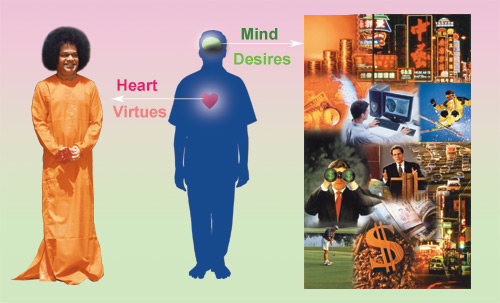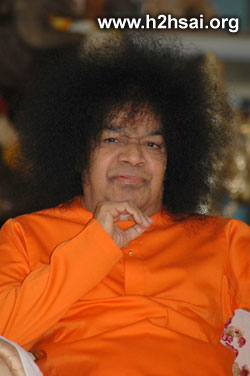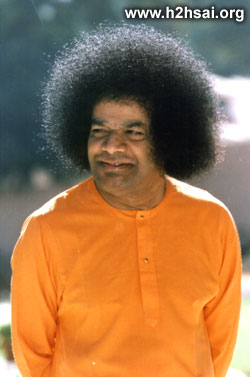SATHYA SAI SPEAKS
MAN’S MAGNIFICENT BODY – HOW TO KEEP IT HEALTHY
The human body is a thing of marvellous beauty. Men cannot easily comprehend the secret of God's creation. No one can explain how the eyes have acquired the power of seeing this phenomenal world. The beauty of all the organs in the human body is a secret of creation. Doctors try to find out how each sense organ and how each limb functions. No one tries to find out why they are functioning in this manner. This secret can be grasped only through the aathmik or Divine Principle.
Our body is surrounded by divine vibrations. If you look at the thumb, there are vibrations of light around it. Few attempt to be aware of this phenomenon. The body is surrounded by vibrations of light. When these vibrations of light from one person meet another, several good things happen.
The Profound Principle behind Human Life and Creation
 |
Human life is based on six constituents in the panchabhuthas (five basic elements) and the athma. To recognise this fact, three paths have to be pursued.
One is to recognise within one's self the presence of Nature and the Divine. A second path is to identify in God the cosmic creation and one's self. The third path is to see in Nature the presence of God and one's self. It is only when knowledge is acquired by these three paths that athma gyaana (knowledge of the Self) arises.
This three-fold path is termed prajna (integrated awareness). Every man should try to understand this three-fold path. This can be done at all times in all places. It has universal application. It has permanent validity everywhere. But, man gets involved in what is impermanent and ever-changing.
Our body is surrounded by divine vibrations. If you look at the thumb, there are vibrations of light around it. Few attempt to be aware of this phenomenon. The body is surrounded by vibrations of light. When these vibrations of light from one person meet another, several good things happen.
The Two Potent Parts of Our Body
The head is preoccupied with enquiring into mundane phenomena. It is concerned with the external; its focus is on objects outside. The heart looks at what is within. The concern with the external has been termed pravritthi maarga (the path of externals)... All man's actions today, including the knowledge he acquires and the wealth he gets, are related to the pravritthi maarga.
There are two important organs for man. One is the heart and the other is the hand. The head is preoccupied with enquiring into mundane phenomena. It is concerned with the external; its focus is on objects outside. The heart looks at what is within. The concern with the external has been termed pravritthi maarga (the path of externals)... All man's actions today, including the knowledge he acquires and the wealth he gets, are related to the pravritthi maarga. The six vices of kaama (lust), krodha (anger), moha (infatuation), lobha (greed), madha (pride) and maathsarya (jealousy) are related to the pravritthi maarga. These undergo constant changes. Because the body is associated with these qualities, it is also subject to change.
 |
But the heart remains unchanging. It is associated with the nivritthi maarga (the inward path). What are the qualities associated with the heart? Truth, compassion, love, forbearance, sympathy and sacrifice; these human qualities emanate from the heart. So, in human life, the head and the heart play crucial roles. These two are kept in balance by the hand. Thus, the heart, the head and the hand are the three H's which are important in studying the human predicament.
Close Nexus between the Mind and Praana
All diseases are a reflection of pravritthi, the disposition of the mind. Hence, in worldly matters, man should follow the right path. In this context, two elements among the five basic elements are important. "Bhikshaannam dheharakshaartham, vasthram sitha nivaraaranam" (Food is essential for protecting the body; raiment is necessary for protection against cold). Associated with food is water. These two occupy pride of place in human life.
Life is the subtle form of the water consumed by man. The mind is the subtle form of the food taken by man. Hence a close nexus should be established between the mind and praana (life force). As is the food, so is the head. A person’s thoughts, desires and aspirations are related to the kind of food he or she consumes.
 |
|
For instance, you may discern from practical experience how food affects the mind. The cyclic process which starts with the formation of clouds and ends in the harvest of grain, determines the kind of food one can have.
Heat (or fire) is the basis of this process. This fire is present within man as jatharaagni, the digestive fire, which accounts for the conversion of the food consumed by man into various forms of energy. This fire has to be in proper balance. When the balance is upset, you have illness.
The state of man's body depends on the maintenance of this balance. Man's entire life depends on preserving this balance. When is the balance upset? When there is no mental steadiness. Men today develop all kinds of intellectual abilities, but they have not learnt how to keep the mind steady. When serenity of mind is achieved, there will be no disease. Illness will not approach you at all.
The Right Quantity and Variety of Food
There should be some regulations with regard to food. Many doctors emphasize the value of proteins and recommend meat, eggs, etc. But proteins derived in this form serve only to build the body, but do considerable harm to the mind.
Doctors are primarily concerned with the gross physical body. They pay little attention to the subtle form of the mental makeup. Most of the diseases that are prevalent in the world today are related to the mind. Mental illnesses seem to outnumber physical ailments. The Vedaantha has declared that the mind is the cause of man's bondage or liberation. This means that the mind has to be used properly and turned towards God.
Equally the mind is responsible for health or sickness. In this context, food is all important. Proteins are present in milk, curds and vegetables as much as in meat. If in the matter of diet, the doctors give the right prescription, diseases can be averted.
In my view, instead of treating people after the onset of illness, it is better to ensure that they do not fall ill at all. Both doctors and the authorities should educate enceinte women about pre-natal care of children in the womb. It is distressing to find that new-born babes suffer from congenital heart diseases.
Humbling Lessons from the Human Cell
When you treat the patient with love, you will win the patient's love. Hence, your motto should be: "Start the day with love, fill the day with love and end the day with love." This is the way to God. Whatever you do should be filled with love. A patient feels reassured when he sees the smiling face of a doctor.
 |
|
Few can realise the limitless potentialities of each cell in the human body. It is one of the great secrets of creation. The cells teach man the lesson of thyaaga (sacrifice). For the progress of human life, sacrifice is essential. The scripture, declares that immortality can be attained only through sacrifice.
Immortality means the removal of immorality. The various cells in the body account for the performance of various functions by the senses and other limbs of the body. The power of the cells comes from the Divine. No one can explain it. Modern scientists term it as a "law of Nature." But wherefrom has this "law" emerged? There should be someone who lays down the law.
For every product, there is a maker. For example, in a silver tumbler, the metal is God's creation while the tumbler has been made by a goldsmith. It has not come as a ready-made tumbler. You have on the earth water and clay. They are God's creation. By mixing them both, the potter makes pots out of them. The creator for the pot is the potter. God is the Creator for the five elements - space, air, fire, water and earth. No one else can create these elements.
Love – the Powerful Prescription
We do not need many hospitals. Patients can be treated easily. In my view, there is no need for you (doctors) to worry about money and resources. Treat your patients with love, duty is God. This love should be mutual give and take. You may charge fees for your services, but do it with love. This is the right course for you. When you render service in this spirit, you will be successful in all cases. When you treat the patient with love, you will win the patient's love. Hence, your motto should be: "Start the day with love, fill the day with love and end the day with love." This is the way to God. Whatever you do should be filled with love. A patient feels reassured when he sees the smiling face of a doctor.
- Divine Discourse on the occasion of Valedictory session of the
Cardiac Speciality Symposium on February 7, 1993.
Dear Reader, how did you like this excerpt from His Divine Discourse? Please share your reflections with us by writing to h2h@radiosai.org mentioning your name and country. Thank you for your time.
- Heart2Heart Team





